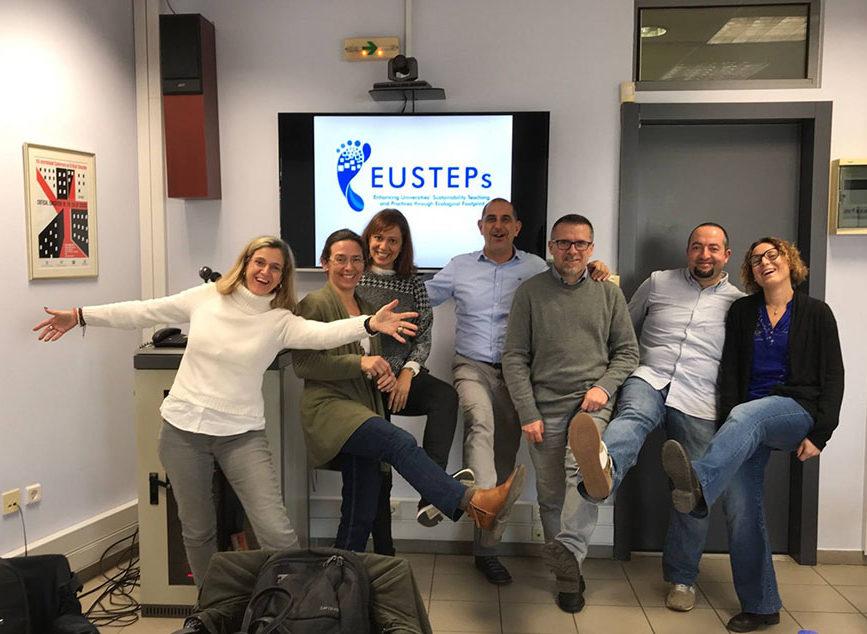The EU-funded sustainability education project EUSTEPs goes live online and in universities’ classrooms
The Ecological Footprint-focused sustainability education project EUSTEPs (Enhancing Universities’ Sustainability Teaching and Practices through the Ecological Footprint) launched today. Its website www.eusteps.eu goes live and teaching activities kicked off at some of the participating universities.
EUSTEPs aims to educate European university students and the wider academic community about the complexity of sustainability and its interdisciplinary nature in an engaging and captivating manner. The program intends to help shape a new generation of sustainability-conscious citizens and professionals who will be trained to measure sustainability with the use of dedicated digital tools, thus introducing a new and necessary professional expertise in society. The project aims also to support the assessment and reduction of the environmental impact of EU Higher Education Institutions (HEIs) through a collaborative experiential approach based on an innovative application of the Ecological Footprint.
“With EUSTEPs, leading experts from high-reputation HEIs across Europe are shaping a new, inclusive approach to engage the whole academic community (students, scholars, staff) in the long path towards sustainability,” said George Malandrakis, Assistant Professor at the Aristotle University of Thessaloniki (AUTH) and EUSTEPs Project Coordinator. “This project is going to provide not only AUTH, but also many other universities around the world going forward, a roadmap to reorient and adjust their ecological footprint to the boundaries set by our one-planet resources.”
Other academic partners involved in the initiative are the University of Aveiro and Universidade Aberta in Portugal, and the University of Siena (Italy).
Funded by the IKY through the ERASMUS + program (KA203 – Strategic Partnerships for Higher Education), EUSTEPs is a three-year project. Under the leadership of AUTH, it is carried out by the strategic partnership between the four European universities and non-profit Global Footprint Network, the official home of the Ecological Footprint methodology and applications.
“The EUSTEPs project speaks directly to an audience of educators that has long been interested in the Ecological Footprint and its application, thus reinforcing our engagement with the education sector. It also speaks to the youth – currently the most active segment of civil society – as our organisation strives to accelerate the transition by design to a one-planet compatible society,” said Alessandro Galli, Director Mediterranean-MENA program at Global Footprint Network.
The project’s partners have announced two key outputs: i) an interactive learning platform providing a set of modules and a MOOC customized for the four target audiences of the project (students, teaching staff, administrative staff, and management bodies) that they envision opening to HEIs around the world after the project is completed in August 2022; and ii) a University Footprint Calculator co-developed by academics, Ph.D. students, administrative staff, and NGO representatives through a participatory process, which will allow users to identify HEIs’ unsustainability drivers & initiate a process of reducing their ecological impact.
Teaching activities kicked off this month at AUTH and the University of Aveiro, to be followed in March by the University of Siena and Universidade Aberta. Each project partner is launching the project at home by bringing the pilot EUSTEPs module to their undergraduate and master students. Developed over the past three months, this module provides students with the fundamental knowledge, skills, and competencies to develop environmental awareness and sustainability focus. After finalizing the initial pilot teaching, the module will be reviewed based on students’ feedback through a post-evaluation survey.
Furthermore, an intensive training workshop for teaching staff and Ph.D. students is scheduled at the University of Aveiro, Portugal, in the last week of May. Teaching staff will be trained on the Ecological Footprint and sustainability, with a focus on how to teach the pilot module and incorporate it into their own courses; Ph.D. students will learn the Ecological Footprint methodology applied to organisations and start looking into how they can contribute to the development of the University Footprint Calculator.
The press release is here and the project’s timeline is there.



